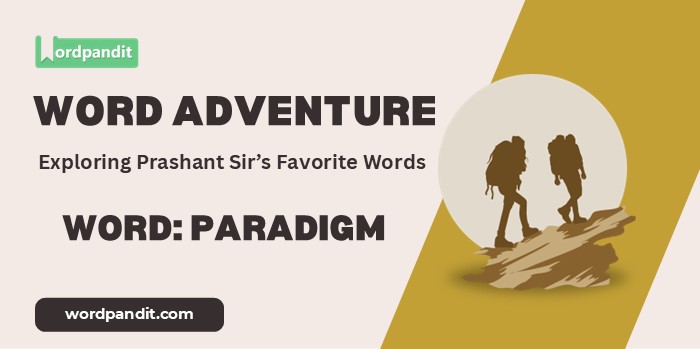Word Adventure: Paradigm
The Headline
"Paradigm: The Pattern That Changes Everything"
The Scoop
In the vast landscape of intellectual discourse, few words have had as profound an impact as 'paradigm'. It's a term that has transcended its humble linguistic origins to become a powerful tool for understanding how we view the world and how those views can dramatically shift. Let's explore this fascinating concept that has revolutionized our understanding of scientific, social, and personal change.
Let's Break It Down
The Plot Thickens
While 'paradigm' has ancient roots, its modern significance owes much to Thomas Kuhn's 1962 book "The Structure of Scientific Revolutions." Kuhn introduced the concept of "paradigm shifts" to describe fundamental changes in scientific understanding, like the move from a geocentric to a heliocentric view of the solar system.
The word quickly transcended scientific circles and entered broader usage, becoming a powerful way to describe any fundamental shift in thinking or practice. From business to personal development, 'paradigm' has become synonymous with the frameworks through which we interpret reality.
Today, the term appears everywhere from corporate boardrooms to self-help seminars, though some argue its widespread use has diluted its original precision. Nevertheless, its core meaning – a pattern or model that shapes our understanding – remains as relevant as ever.
Word in the Wild
The Twist
Here's something intriguing: while we often think of paradigm shifts as rare, revolutionary events, research suggests we actually experience minor paradigm shifts regularly in our personal lives. Every time we have an "aha moment" that changes how we see something, we're experiencing a mini paradigm shift. This personal dimension of the concept suggests that paradigm shifts aren't just about grand scientific theories – they're an integral part of how we grow and learn as individuals.
Make It Stick
Paradigm: The lens through which you view the world – change the lens, and the whole world changes!
Your Turn
Think about a significant paradigm shift in your own life – a moment when your perspective fundamentally changed. What triggered this shift? How did it affect your understanding or behavior? Share your personal paradigm shift stories in the comments below. Let's explore how these transformative moments shape our individual journeys!
Down the Rabbit Hole
- Curious about major paradigm shifts in science? Explore the Copernican Revolution, Darwin's Theory of Evolution, or Quantum Mechanics.
- Interested in business paradigms? Research how companies like Amazon, Tesla, or Apple have challenged traditional industry models.
- Want to explore personal paradigm shifts? Look into cognitive biases, mindset theory, or transformative learning theory.
The Last Word
As we conclude our exploration of 'paradigm', I hope you've gained a deeper appreciation for this powerful concept. It reminds us that our understanding of the world is always filtered through frameworks that can – and sometimes should – change. The next time you encounter a challenging new idea, remember that it might just be the catalyst for your next paradigm shift! Until our next word adventure, this is Prashant from Wordpandit, encouraging you to keep questioning your paradigms and staying open to new ways of seeing the world!

